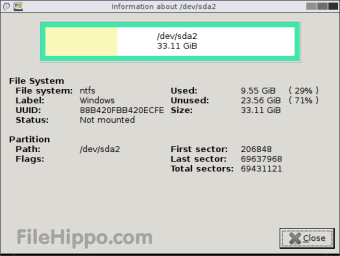スクリーンショット
GNOME Partition Editor (Gparted) is used for creating, reorganizing, and deleting disk partitions. It uses libparted from the parted project to detect and manipulate partition tables. There are optional file system tools that permit managing file systems which are not included in libparted.
Key features include:
- Create partition tables (e.g., MSDOS, GPT).
- Create, delete, copy, resize, move, check, set new UUID, or label partitions.
- Manipulate btrfs, ext2/3/4, f2fs, FAT16/32, hfs/hfs+, linux-swap, lvm2 pv, nilfs2, NTFS, reiserfs/4, ufs, and xfs file systems.
- Enable and disable partition flags (e.g., boot, hidden).
- Align partitions to mebibyte (MiB) or cylinder boundaries.
- Attempt data rescue from lost partitions.
- Supports hardware RAID, motherboard BIOS RAID, Linux software RAID.
- Supports all sector sizes (e.g., 512, 1024, 2048, 4096 byte sectors).
GParted can be used on x86 and x86-64 based computers running Windows, Mac OS X or Linux, by booting from media containing GParted Live.
GParted is a great piece of software that everyone should have stashed away, just in case they have any issues with their hard disk. It is really functional, has lots of nifty tools and has good hardware support. Above all, and I cannot emphasize this enough, it is very easy to use!


